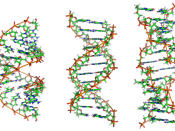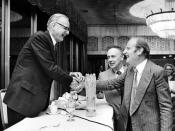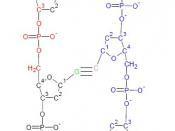Francis Crick Paper
Peter Bokov
December 2, 2007
Biology 7th period
When one thinks of Nobel Prize winner Francis Crick, the double helix of deoxyribonucleic acid, more commonly known as DNA, inevitably comes to mind. Crick's discovery was considered to be "the most noteworthy advance in the understanding of biology since Darwin's theory of evolution" (1), and changed the way many scientists viewed the world. Crick dominated the field of molecular biology because of his great understanding and insight for the subject. His approach to DNA and the genetic code became the standards of scientific teaching as well as references in modern culture. He defined molecular biology from the discovery of the double helical structure of DNA in 1953 to his explanation of the entire genetic code in 1966.
Francis Harry Compton Crick was born on June 8th, 1916, in Northampton, England. Upon graduating from University College, London in 1937 with a second-class honors degree in physics, he took up graduate work in physics, studying the viscosity of water at high temperatures.
These studies were tedious and monotonous to Crick, who was interrupted from his work by World War II in 1939. Crick was agitated and drained by the military work, and his only desire was to go into his chosen field of physics and work where his passions laid. "Crick was torn between molecular biology and the mysteries of the consciousness". In 1947, he applied to work for the Medical Research Council, the agency that promotes biomedical research, and got the job. He said the intellectual alteration requisite by the shift from physics to biology was "almost as if one had to be born again," because in biology, one had to depend on experimental corroboration to a much larger degree than in physics. In 1949 at the medical research...


